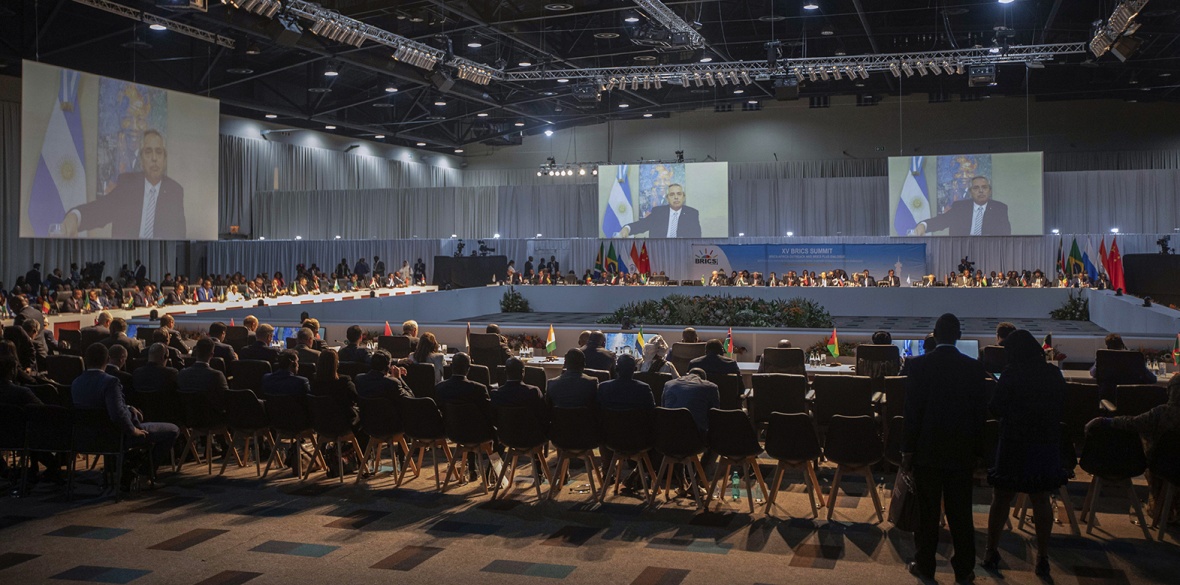This is the last article you can read this month
You can read more article this month
You can read more articles this month
Sorry your limit is up for this month
Reset on:
Please help support the Morning Star by subscribing here
ECONOMIST Jim O’Neill (now Lord O’Neill) originally coined the phrase “Brics” in a 2001 Goldman Sachs economic paper, The World Needs Better Economic Brics, which discussed the prospects for four emerging economies — Brazil, Russia, India and China.
Brics soon became a term used by journalists, pundits and politicians as a soundbite and buzz-phrase.
Last week in Johannesburg, South Africa, this year’s conference of the Brics countries took place and the media sat up and took note.
Many media outlets focused on the unsurprising fact that Vladimir Putin didn’t attend in person as an international warrant would have been issued in South Africa for his immediate arrest.
However some media led on what the conference of the Brics would mean for trade agreements and bodies such as the G7 and the G20, would they form a trading bloc, how would they boost their economic power, was this a power grab by China and who else could join?
The Brics is a diverse group with very different political and economic outlooks. Some want closer ties to the West, others want to go it alone, others want to expand the group’s clout.
“Right now, changes in the world, in our times, and in history are unfolding in ways like never before, bringing human society to a critical juncture. The course of history will be shaped by the choices we make,” said China’s President Xi Jinping in remarks delivered at a Brics business forum by Chinese Commerce Minister Wang Wentao — and interestingly not Xi, who had that same day already met conference host South Africa’s Cyril Ramaphosa.
But it was Brazilian President Luiz Inacio Lula da Silva who opened up the issue of the divergence of views in the bloc, saying: “We do not want to be a counterpoint to the G7, G20 or the United States. We just want to organise ourselves.”
Also on the agenda was dependency on the US dollar. In his pre-recorded message Putin described “the irreversible process of de-dollarisation of our economic ties,” which he said was “gaining momentum.”
The South African hosts responded by making it clear there will be no discussions on a common currency — an idea that had been previously floated by Lula as an alternative to dollar-dependence.
Also on the agenda was how the bloc could expand and what would be the criteria to allow other countries to join.
Reports suggest that India was wary of expansion, suspicious of China’s motives but said it kept an “open mind.”
Lula didn’t want to dilute the influence of the current bloc but said he wanted to see Argentina join. It emerged as one of six countries set to join next year.
Russia is keen to expand membership and South Africa’s Ramaphosa expressed support for expansion at his meeting with Xi.
China is busy with its Belt and Road policy to extend its influence, plus it has lodged its application to join the CTPPT trade deal which Britain recently joined.
Certainly the Brics pledge to embrace the developing world with an offer of an alternative to Western nations finds favour with many countries.
Depending on which reports you read, this varies between 15 and 40 countries, some of which have their written applications in the post.
Returning to Lord O’Neill (and his fondness for acronyms) these applicants may include countries with the potential of becoming members of the world’s largest economies — the N-11 (Next Eleven) including Egypt, Nigeria, Turkey, Mexico, Pakistan, Bangladesh, Iran, Vietnam, Indonesia, South Korea and the Philippines, and the Mints (Mexico, Indonesia, Nigeria and Turkey) which differentiate between the variety of emerging economies.
At this early stage it is difficult see how such a diverse group of countries (and applicants) could work on the basis of reaching a consensus on just about anything — but that does not mean it won’t happen.
The US repose to these events? The White House national security adviser Jake Sullivan told US media he did not see Brics turning into a geopolitical rival of the United States. We shall see.







